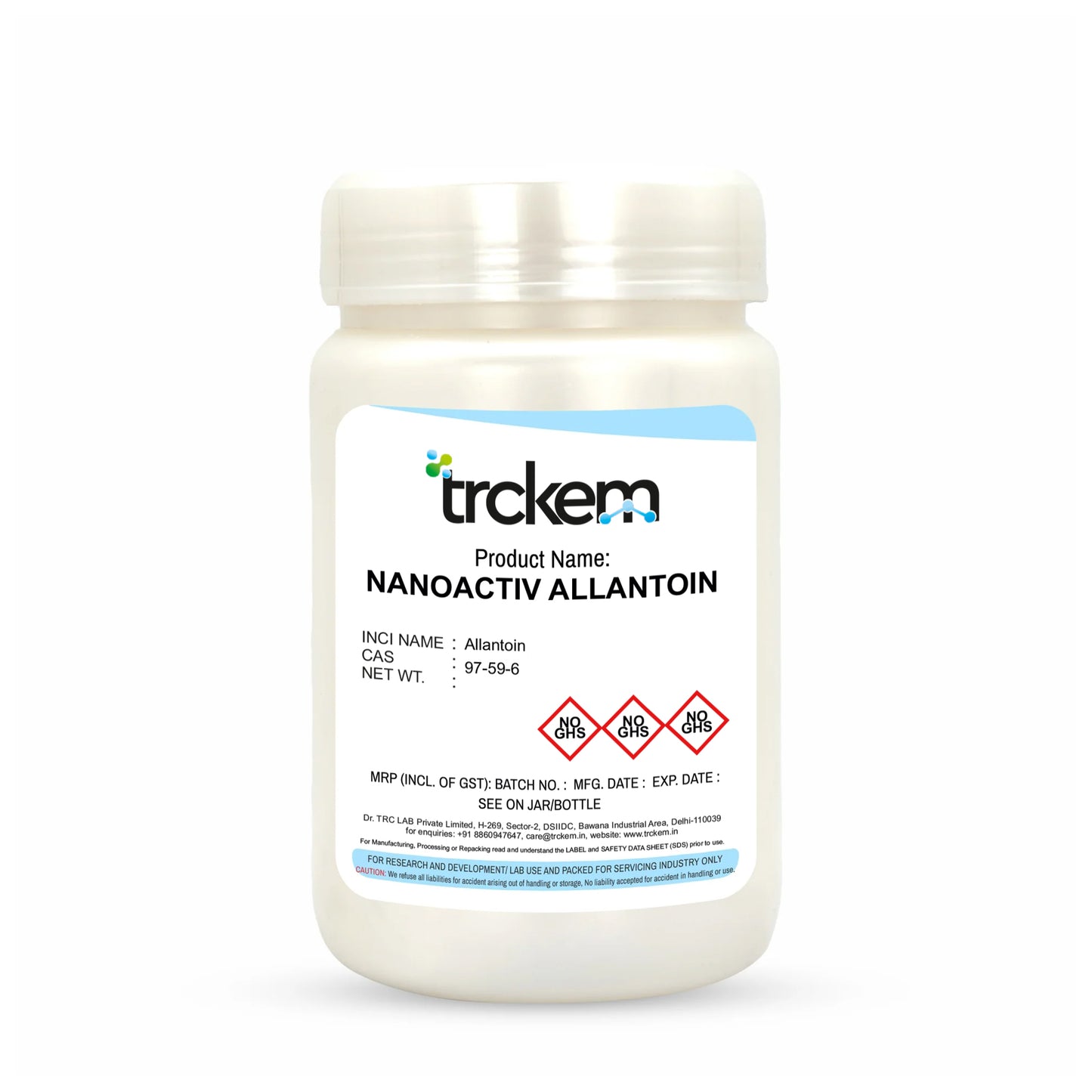

THE STORY OF NANOACTIV ALLANTION

NANOACTIV Allantoin: The Skin Soother in Every Drop
NANOACTIV Allantoin is a gentle yet powerful skin-conditioning ingredient that promotes healing and comfort. Celebrated for its ability to soothe irritation, reduce redness, and encourage skin renewal, Allantoin is found in a wide range of personal care products — from face creams and lotions to aftershaves and baby care. It’s the quiet hero that helps skin look and feel healthier every day.

Derived from Nature, Perfected by Science
Traditionally obtained from the comfrey plant, NANOACTIV Allantoin can now also be produced synthetically to achieve high purity and consistency. TRCkem’s cosmetic-grade Allantoin is refined through precise crystallization processes that preserve its bioactive soothing properties, ensuring stability, safety, and performance in every formulation.

Soften. Heal. Protect.
NANOACTIV Allantoin enhances the skin’s natural healing capacity by promoting cell regeneration and reducing inflammation. It softens keratin, helping to smooth rough, dry, or flaky skin. Its calming effect makes it ideal for sensitive-skin formulations, after-sun care, and post-shave products. Combined with moisturizers, it helps maintain a soft, supple, and rejuvenated appearance

Trusted, Safe, and Globally Approved
NANOACTIV Allantoin is compatible with most cosmetic systems and stable within a wide pH range (4–8). Recommended usage: 0.1–2%. Store in a cool, dry place away from moisture. Non-toxic, non-irritating, and fully compliant with global cosmetic standards (EU, FDA, REACH, and COSMOS). TRCkem’s NANOACTIV Allantoin ensures your formulations deliver both safety and skin wellness.
Formulator’s Queries, We Answered
1. What is Nanoactiv-Allantoin?
Nanoactiv-Allantoin is a nano-encapsulated form of Allantoin, a skin-soothing, anti-inflammatory compound used in skincare. The nano-technology enhances absorption, stability, and efficacy, making it ideal for sensitive and damaged skin.
2. What is the CAS number and INCI name of Nanoactiv-Allantoin?
CAS Number: 97-59-6 (for Allantoin)
INCI Name: Nanoactiv-Allantoin
3. What are the cosmetic benefits of using Nanoactiv-Allantoin?
Nanoactiv-Allantoin offers:
Enhanced skin regeneration
Deep moisturization
Anti-irritant and anti-inflammatory effects
Improved delivery and longer-lasting effects due to nano-encapsulation
4. Is Nanoactiv-Allantoin safe for sensitive skin?
Yes, it is especially formulated for sensitive or irritated skin. The nano-delivery system allows for controlled, gentle release, reducing the risk of irritation.
5. Can Nanoactiv-Allantoin be used in natural or vegan cosmetics?
Yes. When sourced ethically, it is non-GMO, vegan-friendly, and often derived from plant-based sources like sugar beets or comfrey. It is also cruelty-free.
6. Is Nanoactiv-Allantoin allowed in clean beauty or eco-conscious formulations?
Yes. It meets most global cosmetic regulations including EU Cosmetics Regulation and FDA guidelines, and can be used in eco-friendly, sustainable, and clean-label products, depending on supplier certification.
7. In which types of products is Nanoactiv-Allantoin typically used?
You can find it in:
Moisturizers & creams
After-sun care
Anti-aging serums
Soothing lotions & masks
Hair treatments for scalp relief
Aftershave & post-wax products
8. Are there any side effects or warnings associated with Nanoactiv-Allantoin?
It is generally very well-tolerated. However:
Avoid eye contact
Perform a patch test for allergy-prone users
Not intended for ingestion
9. Is Nanoactiv-Allantoin compatible with other active ingredients?
Yes. It works well with ingredients like hyaluronic acid, niacinamide, panthenol, ceramides, and natural oils, making it suitable for a wide range of synergistic skincare formulations.




